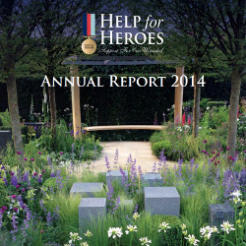Help for Heroes has seen its total income increase by £3.3m following four years of decline, according to its accounts for the year ending September 2014.
The charity has seen a steady decline from £46.6m in 2011, but this year total income rose from £33.9m to £37.2m.
But total spending was up £12m to more than £33m.
The fundraising and campaigning charity’s voluntary income has increased by £2m up to £26m, which is, in part, due to an increase in legacies of just under £4m. This follows a fall the previous year in its voluntary income of 21 per cent.
The increase in the charity’s expenditure was largely due to an increase in the number of grants it awards, from totalling £789,000 to £5.5m, and an increase of a third in spending on “recovery delivery costs”, which involves supporting the wounded, bringing it up to £15m.
Help for Heroes has a group structure, and consists of two charities – one which fundraises and campaigns, and the other which delivers recovery – and one trading company.
Help for Heroes Recovery had an income of £8.5m, up from £3.2m the previous year, which comes almost entirely from grants from the fundraising and campaigning charity.
The amount spent on employees rose by approximately £3m for the group. Meanwhile, the average number of employees increased to 304 from 224.
Help for Heroes holds £4.8m of free reserves, enough for five months of fixed running costs. This is slightly below the charity’s reserves policy of holding between six and 12 months of anticipated fixed running costs.
Bryn Parry, the charity’s chief executive, said: “Historically, much of our income has come from voluntary donations. However, that balance is changing as single voluntary donations are making way for other more predictable ways of giving such as regular giving and legacies.
“In this financial period we sought to stabilise our income, reversing a downward trend that had been evident since a peak in 2010. That year saw some of the worst fighting in recent times, and the public’s reaction to what they saw on their TVs, internet and in their newspapers throughout 2009 and 2010 was incredible.”








